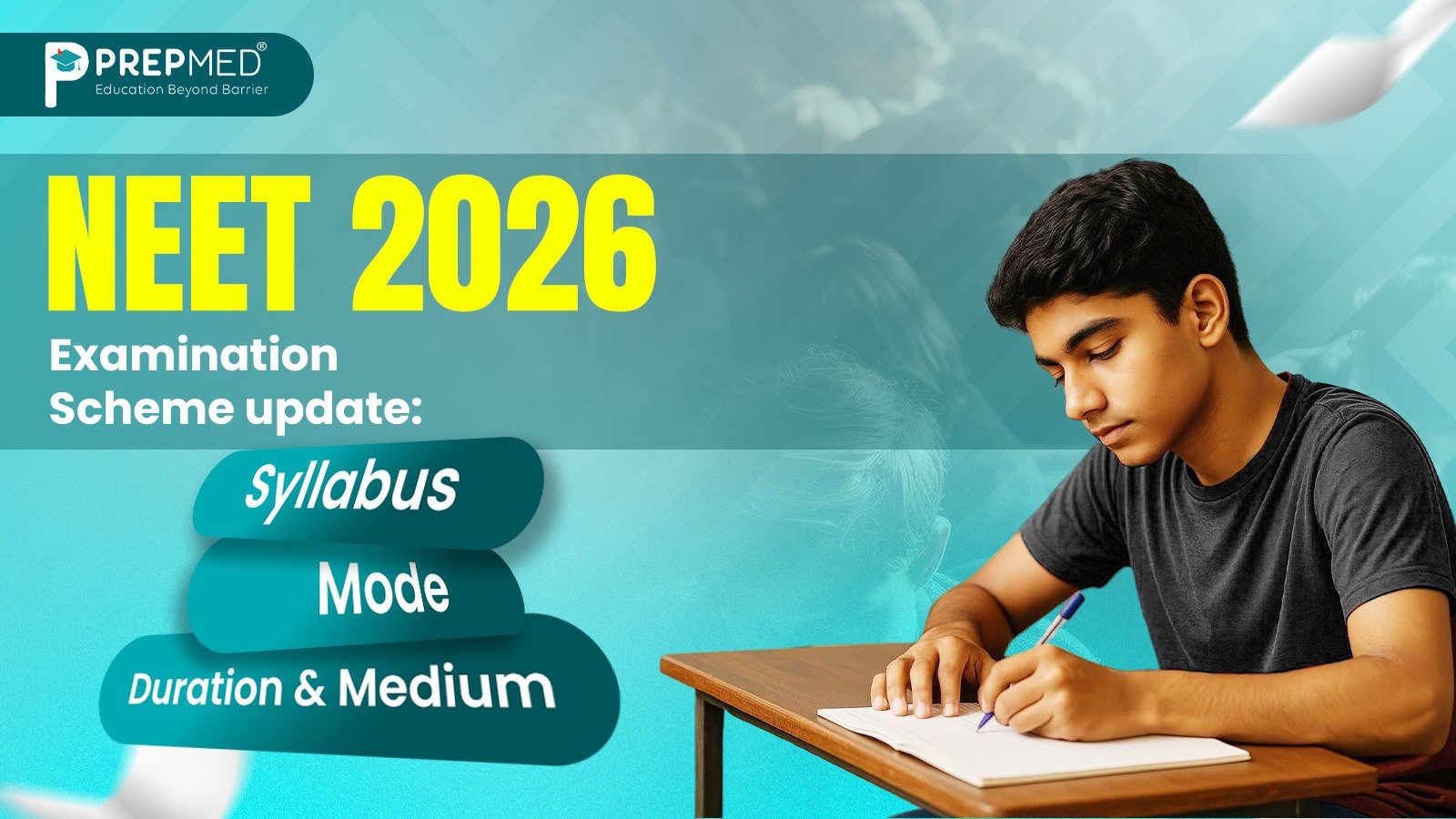April 04, 2025
NEET 2025 is Almost Here: Are You Prepared for the Final Day?
Your primary focus should be on the National Eligibility cum Entrance Test (NEET) 2025 since the exam day is almost here around the corner. Aspiring doctors need to pass the NEET 2025 exam with good ranks and scores because it grants access to pursue MBBS and BDS alongside various paramedical courses across all Indian medical colleges, both public and private. You need to evaluate your preparation because the upcoming NEET 2025 exam holds exceptional importance. So, are you ready?
What is NEET?
The National Testing Agency (NTA) conducts NEET as a national-level entrance exam that provides access to undergraduate medical courses. The examination tests the knowledge of candidates on their Physics, Chemistry and Biology. The examination contains questions that focus on the NCERT syllabus from classes 11 and 12. The competition for NEET is very high because achieving a good score in this examination allows students to enroll at prestigious medical colleges throughout the nation.
Why is NEET 2025 Crucial?
For students who have a dream of becoming doctors, NEET 2025 is not just another exam. It represents years of hard work, dedication, and sacrifice. With the medical profession continuing to be one of the most respected and rewarding careers, the pressure to perform well in NEET has only increased. Moreover, medical seats in India are limited, making competition tougher with each passing year.
The NEET 2025 Challenge:
NEET 2025 will be an extremely competitive national entrance exam because approximately 23 lakhs students will be participating this year. The number of candidates applying for NEET increases continuously every year, thereby raising the expected preparation standards. Are you prepared to face this exam?
How do you plan your revision during the last month before NEET 2025?
1. Prioritize High-Weightage Topics
Dedicate the last month exclusively to challenging topics that have considerable weight in the NEET 2025 exam. The NEET examination prioritizes certain chapters within the Physics, Chemistry, and Biology sections that have significant weightage. Previous years' papers should be studied to discover the key chapters with high importance.
- Physics: Students need to concentrate their studies on Mechanics alongside Electrostatics and Optics together with Modern Physics and Thermodynamics.
- Chemistry: Organic Chemistry (especially reactions and mechanisms), Physical Chemistry (like Mole Concept, Solutions, and Gaseous State), and Inorganic Chemistry (important compounds and periodic table trends).
- Biology: Students should prioritize studying Genetics along with Ecology and Reproduction and Human Physiology along with Plant Physiology, since a maximum number of questions are asked from these units.
2. Take Full-Length Mock Tests
Practicing full-length NEET mock tests serves as an effective tool for last-minute revision and preparation for NEET 2025. Mock tests provide realistic exam environments that help students learn time management skills. Perform at least three mock tests every week as part of your revision process. After each test:
- Review your mistakes: Note your errors and challenging topics that caused confusion during your mock exam. Spend more time on revision sessions of those subjects to achieve a better understanding of major concepts.
- Work on speed and accuracy: The limited time requires you to practice questions both rapidly and accurately without making mistakes.
3. Revise Conceptual Clarity
Instead of trying to cover new topics, spend time strengthening your understanding of the concepts you've already learned for your NEET 2025. You should use your NCERT textbooks together with reference materials to solve any doubts you have regarding your understanding.
- The main focus should be on frequently asked formulas and essential concepts.
- Students should practice both derivations and numericals in Physics.
- Students should focus on essential reactions combined with mechanisms and inorganic compounds while studying chemistry.
- Studying diagrams, processes, and flow charts in Biology should be your main priority (e.g., photosynthesis, morphology, and circulation).
4. Use Short Notes and Flashcards
Before beginning your preparation, you probably created short notes, summarizing sheets, and flashcards that summarized essential ideas and chemical reactions and equations. These notes serve as important revision tools during the last month before the exam.
- Flashcards: Flashcards function as valuable tools for revising both essential Physics and Chemistry formulas in addition to essential Biology definitions and processes.
- Short Notes: Use your short notes for last-minute quick reviews of important topics. Try to revisit all your notes in a systematic manner, especially when you feel less confident in a particular subject.
5. Focus on Weak Areas
You need to review every subject, but you should pay special attention to the subjects that are challenging for you. Pay additional time to understand concepts you find challenging. This might include practicing more questions from weak areas, revising the theoretical concepts, and seeking clarification if needed.
- Break down complex topics: If there are any topics that seem difficult, break them into smaller sections and focus on mastering them one step at a time.
- Get help: Do not hesitate to seek assistance from teachers and mentors, along with online resources, when you get stuck on a specific concept.
6. Solve Previous Years’ Papers
Previous years' NEET question papers should be solved by candidates to understand the exam pattern and typical types of questions. The previous year's papers help you recognize which topics are asked most frequently on exams and evaluate the difficulty level of questions.
- Timed Practice: Solving these previous year's papers with exam-like conditions prepares students to manage their time effectively.
- Analyze: Evaluate your results by assessing the solution to the questions after completing the papers. Note errors, improve your weak areas, and track the most common pattern of questions.
7. Revise Biology Thoroughly
Since Biology is often considered one of the easier subjects to score in NEET, use the final month to reinforce your knowledge in this subject. Revise all the essential diagrams and definitions along with fundamental concepts. Pay special attention to Genetics, Evolution, and Human Physiology because these topics appear most frequently on the exam.
- Flowcharts combined with diagrams serve as efficient memorization tools.
- Revisit all practical diagrams from your textbooks, like the structure of plant and animal cells, the human skeletal system, and the digestive system.
8. Time Management Practice
The last month should be dedicated to improving your exam time management skills. Practice completing the entire paper in 3 hours.
- Target completion time: Set specific time goals for Physics, Chemistry, and Biology in order to distribute examination time evenly across all questions.
- Skip and return: When a question takes too long to answer, you should move on and then come back to it. The strategy enables you to distribute your time effectively.
9. Stay Healthy
Mental and physical health play a vital role during your revision period. In the final month, it's essential to ensure that you're physically and mentally fit for the exam.
- Sleep: Your daily routine should include 7 to 8 hours of sleep each night. Not getting enough sleep reduces your capability to focus and significantly affects your memory function.
- Diet: Eat healthy and balanced meals. Include brain-stimulating foods, which consist of fruits with vegetables together with nuts and proteins in your diet.
- Exercise: Minimal exercise combined with yoga practice or meditation allows students to reduce stress levels while improving their ability to concentrate.
10. Stay Calm and Positive
During the concluding month you will experience high levels of pressure together with stress. Normal anxiety occurs during this period, yet staying positive and calm remains crucial.
- Maintain a positive mindset: Keep a positive mental outlook by avoiding comparison with other people. Concentrate on your preparation work and monitor your progress.
- Take short breaks: Short breaks allow you to refresh your mind during your study sessions. Schedule brief rest sessions of 5 to 10 minutes whenever you study for one hour.
- Stay away from distractions: Limit social media and other distractions that might divert your focus from your studies.
11. Plan Your Exam Day Strategy
In the final days of NEET 2025, it's crucial to have a strategy in place for the exam day itself.
- Know the exam center: Ensure you have a clear plan to reach the exam center on time.
- Prepare your essentials: The day before the exam, pack all necessary items, such as your admit card, ID proof, pen, and water bottle.
- Stay calm: On the exam day, stay calm, read the questions carefully, and manage your time wisely.
Final Thoughts: Are You Ready for NEET 2025?
NEET 2025 may seem distant, but the reality is that now is the time to start. The sooner you begin your revision, the better equipped you'll be to tackle the challenges ahead. A structured study plan, proper guidance, and regular practice are the key factors for success.
As NEET 2025 is around the corner, take a moment to track your progress. It’s time to make those final revisions and push yourself to new heights. The future is in your hands, so let’s get started today!
Also Check:
Top 2 Mistakes You Must Avoid to Boost Your NEET 2025 Score
Key Alternating Current Questions for NEET 2025 Preparation
Your Roadmap to NEET 2025 Success: The Perfect Plan






